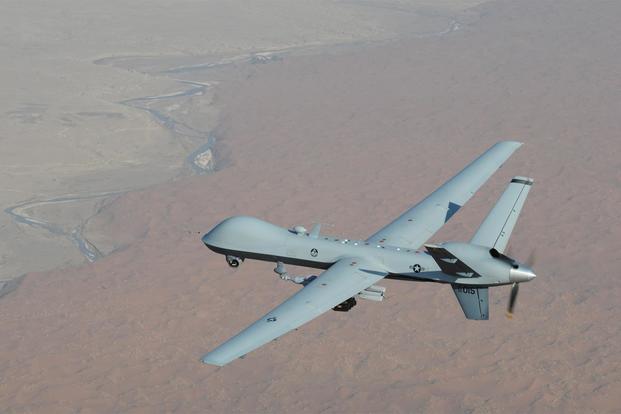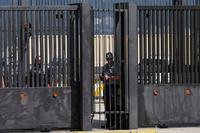The Pentagon is pushing back on a new Amnesty International report that alleges the Defense Department is responsible for civilian casualties that occurred in a ramp-up of air strikes in Somalia over the last two years.
United States Africa Command says that there have been no civilian casualties as a result of U.S. air strikes targeting the al-Qaida-affiliated extremist group al-Shabaab.
"Our assessments found that no AFRICOM air strike resulted in any civilian casualty or injury," the command said Tuesday in a release. "Our assessments are based on post-strike analysis using intelligence methods not available to non-military organizations."
During research for its report, the London-based human rights organization originally submitted 13 allegations of civilian casualties in October 2018 and February 2019, AFRICOM officials said.
Officials said the group corresponded with the command regarding eight air strikes that occurred between 2017 and in 2018 that Amnesty International says directly contributed to civilian casualties.
The final Amnesty report investigated five incidents in the Lower Shabelle region in southern Somalia between April 2017 and December 2018 "where civilians allegedly were killed by U.S. air strikes," the group said. The five incidents were carried out with "[MQ-9] Reaper drones and manned aircraft in the … region largely under al-Shabaab control outside the Somali capital Mogadishu," the report said.
The report, "The Hidden U.S. War in Somalia," details how 14 civilians were allegedly killed and eight more injured in just five of the 100-plus strikes in the past two years. The group interviewed 65 witnesses and survivors of the five alleged U.S. strikes and another 77 witnesses and survivors "of other alleged U.S. air strikes in Somalia which are not detailed in this report."
The findings "directly contradict" AFRICOM's zero-casualty claim, and the incidents "appear to have violated international humanitarian law, and some may amount to war crimes," Amnesty said.
"We work with all information reasonably available at the time prior to taking any decision to apply lethal force against al-Shabaab in support of our Somali partners," a Defense Department official said during a phone call with reporters Tuesday.
"But we do take allegations of civilian casualties seriously regardless of their origin," the official said, adding that officials investigate all civilian casualty reports including those that surface on social media.
"We have the ability immediately after the event to continue our assessment of the military conditions [and] the social media environment in using all the information available to us" for a post-strike assessment, the official added.
Related content:
- No Changes for DoD After Trump Eases Civilian Casualty Reporting Requirements
- US Didn't Fly in Recent UAE-Led Exercise
- US MQ-9 Reaper Drone Takes Out Russian T-72 Tank in Syria
Since June 2017, the Pentagon estimates it has killed 803 al-Shabaab militants in strikes. AFRICOM has independently investigated eighteen civilian casualty reports, including those reported through its own internal military channels in that timeframe.
Amnesty International has been tracking the reports, and has raised concerns over the ramped-up pace in air strikes. The organization has claimed that the U.S. military's strike count in Somalia has tripled under the Trump administration since 2016, outpacing strikes in Yemen and Libya combined.
"U.S. forces have carried out 34 strikes in Somalia in the last nine months of 2017 -- more than in the entire five years from 2012 to 2016. This increased again in 2018, to 47 strikes; and there have already been 24 in the first two months of 2019 alone," Amnesty said.
On Tuesday, AFRICOM conducted its 28th air strike this year, DoD officials said in a separate announcement.
In addition to the remotely piloted aircraft like the MQ-9, the manned AC-130 gunship -- either the AC-130W Stinger or AC-130J model -- is likely used in the escalated targeting, the group noted.
The AC-130 "has been outfitted with long range precision guided weapons, evidence in this report indicates the AC-130 is now being used in Somalia in a role that had been filled by drone aircraft," Amnesty’s report said. The group has also scrutinized whether other American aircraft, such as drones piloted by the Central Intelligence Agency, the Army's Grey Eagle drone or the Marine Corps' KC-130J aircraft outfitted with a "Harvest Hawk kit" may have contributed to recent strikes.
DoD officials on Tuesday would not comment on what U.S. assets are conducting strikes in the region.
The officials on the call noted that the Kenyan and Ethiopian militaries also carry out air strikes in Somalia, but did not discuss whether the countries may have contributed to the alleged civilian casualty count.
The U.S. military’s pressure on al-Shabaab will continue, the DoD official said Tuesday.
"If the enemy presents us opportunities to support this strategy, we're going to take advantage of those opportunities," the official said. "AFRICOM has a continent-wide responsibility to apply the resources where they make the most sense."
There are 500 to 600 U.S. troops in Somalia at all times, the official said.
-- Oriana Pawlyk can be reached at oriana.pawlyk@military.com. Follow her on Twitter at @Oriana0214.












